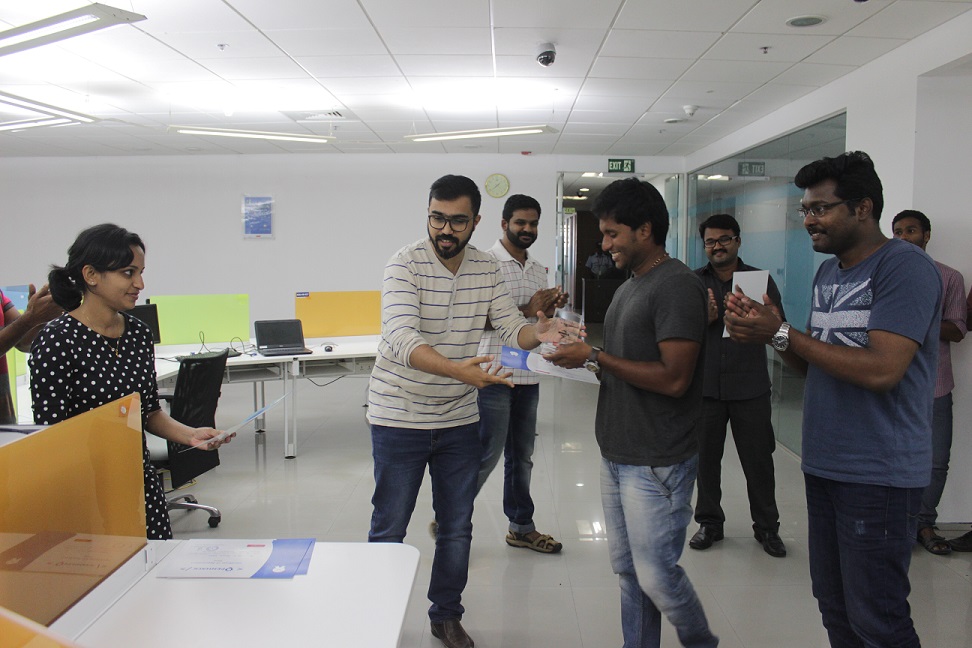How to Retain Top App Developers in Your Company
In today’s tech-neutral age, talent is the key differentiator between companies, with employees a key source of competitive advantage. Top app developers are in high demand to ride the mobility wave, and enterprises scramble to retain developers from being poached.
Developers are by and large content with their current jobs, but three out of four developers are open to new opportunities, and would readily change to a job that offers them better working conditions. Even developers not actively seeking out jobs do spend around an hour per week checking on potential jobs. This is in addition to the time they spend with other developers and potential recruits on communities such as Stack Overflow. In such a state of affairs, employers need to remain on their toes always, to retain developers.
Here are some tips to retain top talent in your enterprise, without allowing competitors to lure them away.
Provide Opportunities to Grow
Most programmers are knowledge workers who value their skills and strive to keep themselves updated. One in every three programmers contribute to open source projects, and a whopping 81% of developers program as a hobby as well. These programmers are neither beholden to any organization, nor dependent on any corporate training program for their skill enhancement. They remain with their organization as long as it is worth their while, and simply move elsewhere if the organization get in the way of their development. Their loyalty is to themselves first and to any organization second. Organizations would do well to understand this fact and provide employees opportunities to grow and develop their skills.
A good salary and fringe benefits are now a basic requirement, rather than any special motivators to ensure employees stay. Rather, if an employee feels the enterprise offers them opportunities to enhance their skill-set, valuable exposure, time to spend in creative pursuits, and more, they are more likely to stay.
Get the Leadership Right
Very often how the employee is treated in an enterprise determines whether he or she sticks on or leaves. As a rule of thumb, an authoritative leadership style is a sure-fire way to doom for the enterprise, and a servant leadership style, where the focus is to serve the employee, by facilitating them to do their thing, works wonders.
Having said this, a charismatic leader, who can lead from the front and motivate employees by dint of authority can also work wonders, no matter the leadership style. A good case in point is Steve Jobs, who would yell and publicly shame his teammates when dissatisfied with their work, and yet made Macintosh engineers believe they could achieve the impossible.
Keep Employees Motivated
The most effective retention trick is to facilitate the employee harness their creativity in tasks that matter to them. Abraham Maslow’s time-tested need-hierarchy theory lists out five levels of needs or motivation that satisfied an employee, starting from the basic psychological and safety needs, a moving on progressively to need for affiliation, esteem, and self-actualization. Most developers, by dint of being “knowledge workers”, have already accomplished their basic needs, and look primarily at higher level needs such as esteem and self-actualisation.
The onus is on the enterprise, especially HR to craft retention strategies, keeping in mind what exactly motivates an employee, and would prompt them to stay. Challenging work assignments, rewarding projects that would enable them to gain the esteem of their co-workers and peers, a sense of satisfaction on having accomplished a project that is really useful, and more are some ways to retain the employee’s interest to stay.
Pamper the employee
Motivating the employee into staying is of no use unless the basic systems are in place. Developers being highly skilled “knowledge workers.” The onus is on the enterprise to facilitate a congenial working atmosphere to do their thing.
Facilitating the employee means pampering to their needs, and a flex-and-fun time, combined with work-from-home options lead the list of facilities sought after by most developers. About 64% of developers already work remotely at least one day each month, and 11% of developers work remotely on a full-time basis, as of now. Nevertheless, much more is required to keep developers happy, and facilitate their creativity. While 57% of developers valued the ability to work from home on vacation days most, 53% of employees valued vacation days, 47% of employees valued health benefits, 40% of employees valued work hours, and 40% of employees valued the equipment they use.
Autonomy and Career path
At times, retention of talent may have more to do with a dysfunctional enterprise than any other factor. A rigid and hierarchical enterprise, with a culture of deferring to authority, and where information is kept on a tight light is hardly congenial for developers, who value creativity and openness. Most talents seek to leave enterprises where talent and merit are not valued, where promotions are a matter of tenure and not merit, and where there are no mentors to guide them.
Programmers value autonomy and empowerment. Empowering them to take crucial decisions regarding their projects, entrusting them to engage with clients directly, drawing deadlines through a collaborative process rather than imposing one from the top, are all steps that make employees feel valued, appeal to their self-esteem, and go a long way in retaining them for the enterprise.
Also, enterprises that fail to chalk out a clear career path for their top talent risk them leaving. Not all developers make competent managers, and many of them do not even seek a managerial position. The onus is on enterprises to ensure progress in roles and responsibilities that suit them. A technical path, parallel to a managerial or supervisory role, may work best for technocrats who may not find managing people their cup of tea.
Top programmers seek continuous value. They seek out highly challenging projects and seek to leave when they perceive the projects they work on are futile or destined to failure.
Getting and retaining top app developers is not easy. However, we offer an effective alternative. We already have a team of highly talented, resourceful, and experienced app developers, with a track record of having delivered several intuitive mobility and other projects, for customers cutting across industries. When you hire us, you are free of all your human resources related worries. Retaining the top talent, pampering them, and preventing others from poaching the best talent becomes our headache, leaving you free to focus on your business.
Stay up to date on what's new

Recommended Posts

09 Nov 2021 B2B
How Is the ‘New Normal’ Transforming the Future of HR and Talent Management?
The entire world is grappling with the scare of the COVID-19 pandemic. Given the uncertainty of the pandemic, Human Resources departments across the globe went into overdrive to map out……

17 Mar 2021
Fingent Recognized as a Great Place to Work-Certified™ Company
Fingent Designated as a Great Place to Work-Certified™ Company Fingent is proud to announce that we have been Great Place to Work-Certified™ by the prestigious Great Place To Work® Institute. ……

04 Sep 2020
Why Develop a Custom Platform for Remote Employee Hiring and Onboarding?
Experience remote hiring success with custom hiring and onboarding platform Even before the pandemic hit, the number of employees working remotely has grown considerably over the past few years. The……

13 Nov 2015
The Line Manager gets IT right: Why Line Managers should take technology decisions.
Last spring, we found ourselves working with a global media giant, to understand why their new high tech enterprise information sharing IT system was not being used by employees. As……
Featured Blogs
Stay up to date on
what's new

















